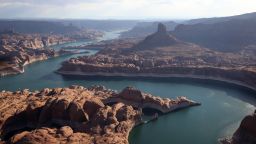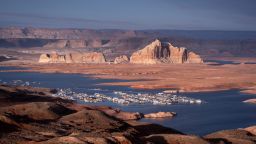As the climate crisis intensifies, battle lines are beginning to form over water. In Arizona – amid a decades-long megadrought – some communities are facing the very real possibility of losing access to the precious water that remains.
Outside the city limits of Scottsdale, where the asphalt ends and the dirt road begins, is the Rio Verde Foothills community. Hundreds of homes here get water trucked in from Scottsdale, but those deliveries will end on January 1, 2023.
That’s because last summer, for the first time ever, drought conditions forced the federal government to declare a tier 1 water shortage in the Colorado River, reducing how much Arizona can use.
Meredith Deangelis lives in the community, and the thought of losing access to water keeps her up at night.
“Every time I brush my teeth, I think, ‘Oh my gosh, I can’t imagine that I’m not going to have water to brush my teeth,’” Deangelis told CNN.
Scottsdale’s water department told CNN in an email that “Scottsdale has continued to be a good neighbor in allowing Rio Verde to temporarily use its water supply.” The department said that due to the current water shortage, by law it “must dedicate its limited water supply to its residents.”
Deangelis and her neighbors are hoping to find another water source to purchase for their homes, but in order to do that they must get certain approvals from their county, which has not happened yet.
“To think, I have this beautiful home and I’m not going to be able to live here because water is not going to be approved and provided to my home is just incredibly unnerving and stressful,” Deangelis said.

On the western border of Arizona, acres of farmland are luring big-city investment firms to rural Cibola. The land there comes with water rights to the Colorado River, a prized possession in a drought-ravaged state.
Greenstone, a Phoenix-based investment firm, bought nearly 500 acres with the intent to sell the land’s water allotment to Queen Creek, a growing Phoenix suburb about 200 miles away.
Holly Irwin, a district supervisor in La Paz County, home to Cibola, is fighting the plan.
“We are what I call the ‘sacrificial lamb’ for the bigger areas,” Irwin told CNN. “In my opinion, look somewhere else – we need to be able to sustain ourselves.”
The scarcity of water in the state is pitting small towns against fast-growing metropolitan communities.
Queen Creek’s utility director, Paul Gardner, says the community has a 100-year supply of groundwater, but he’s planning for the decades beyond that to make sure the community will always have a sustainable water source.
“We are looking at every possible volume of water that can be acquired and transferred legally in the state,” Gardner said.
Grady Gammage, an attorney representing the Greenstone investment firm, told CNN that the water can be transferred to wherever the owner chooses.
“It doesn’t somehow default to communities on the river if it isn’t transferred,” Gammage said in an email. “The Cities along the river currently use less than half of their existing municipal entitlement. They can likely triple their population under their existing allocations before they would need to acquire additional water.”
But Irwin argues if this one water transfer is allowed, it will open the door to many other large investment firms buying up the land and water rights in her community.
“My main concern with all of this is the precedent that is setting, that is what’s so scary,” Irwin told CNN. “This water needs to remain here it was meant to remain here for future development.”
Both communities say these water rights are key to their sustainability. The federal Bureau of Reclamation will make the final decision on whether to approve the water transfer. The agency did not respond to CNN’s request for comment.
Democratic Sen. Elizabeth Warren from Massachusetts and Rep. Ro Khanna, a Democrat from California, recently introduced a bill aimed at preventing large corporations from profiting off water rights.
“Water is a human right and Wall Street shouldn’t be allowed to use this vital resource to make profits at the expense of hardworking Americans,” Warren said in a statement.
Arizona’s population growth and extreme drought have increased demand for water in limited supply.
Kathleen Ferris, a senior research fellow with the Kyl Center for Water Policy in Arizona, says water scarcity in the state has resulted in the “haves” and the “have nots,” and likened the coming water battles to the days of the Wild West.
“Once you have your water rights, you defend it,” Ferris said. “That’s the way it works.”
As the climate crisis continues unchecked, so, too, will the water wars in the nation’s driest states.






